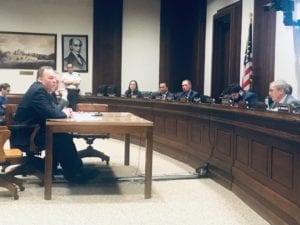Who is a member?
Our members are the local governments of Massachusetts and their elected and appointed leadership.

Franklin Public Works Director Robert Cantoreggi and MMA Legislative Director John Robertson testify before the Legislature’s Joint Committee on Transportation on March 5.
In testimony before the Legislature’s Joint Committee on Transportation, the MMA on Tuesday made its case for an increase in funding for the Chapter 90 local road program to help cities and towns keep local roads safe and in good condition.
At a hearing on a bill filed by Gov. Charlie Baker (H. 69) that would provide $200 million for Chapter 90 in fiscal 2020, the MMA argued that cities and towns desperately need an increase in order to keep 30,000 miles of local roads and more than 2,500 bridges in a state of good repair.
A statewide analysis by the MMA in 2018 documented that cities and towns need $685 million per year to keep local roads and bridges in a state of good repair (a best practice standard for maintaining capital assets), but they spend far less due to inadequate resources. Chapter 90 is widely considered a vital source of funds for local road construction and repair.
An increase for Chapter 90, the MMA testified, would improve quality of life, ensure public safety, stimulate economic development, and save money over time. According to the U.S. Department of Transportation, once a local road is in a state of good repair, every dollar invested to keep it properly maintained saves $6 to $10 in avoided repair costs that would become necessary to rebuild the road if it were to fail due to a lack of maintenance.
The MMA also pointed out that Chapter 90, a reimbursement program, shares state transportation tax dollars with every community in the state.
The MMA asked the committee to support a multiyear Chapter 90 bond authorization that provides $300 million per year to start and is indexed to account for inflation in future years, in order to protect against the loss of purchasing power.
The Massachusetts Highway Association joined the MMA in making the request to the committee.
The Transportation Committee was also urged to take action as soon as possible, so the measure can be signed into law and cities and towns can begin the construction season on time. When cities and towns are forced to bid, award and start work on projects in a significantly shortened construction season, it drives up the costs to taxpayers.
The MMA testified that a multiyear Chapter 90 bill would provide predictability regarding the amount and timing of reimbursement funding, significantly improving the ability to plan at the local level. When Chapter 90 funding levels differ from year to year, it is difficult for communities to plan multiyear projects or to know how many years it will take to implement a comprehensive pavement management plan.
With the exception of an extra $40 million paid from surplus revenue at the end of the last fiscal year and a single-year bump to $300 million in fiscal 2016, the Chapter 90 program has been held flat at $200 million annually since fiscal 2012, while the cost of materials, labor and construction have been rising, creating a substantial gap between the local need and actual funding for the program.
Testifying as part of the MMA panel, Franklin Public Works Director Robert Cantoreggi pointed out that the strong economy in recent years has increased demand for contractors, which has fueled cost increases.
“Five or six years ago, when there was no private work out there, no subdivisions being built, I was getting a lot of good prices,” he said. “Now that the economy is good, I have to pay a lot more because they have options.”
During the hearing, Transportation Secretary Stephanie Pollack said the administration is open to a multiyear Chapter 90 plan.
“We’re very open to talking to the Legislature if there’s a desire to do a multiyear authorization,” she said.
The Senate passed a multiyear bill last year, but House-Senate conference committee negotiators settled on a single-year, $200 million package in the end. Rep. William Straus, co-chair of the Transportation Committee, told the State House News Service that he expects the House to support a one-year bill once again.
The state does often pass multiyear borrowing bills for its capital spending in areas like transportation, the environment and housing.
Gov. Baker’s bill (H. 69) would also allocate $200 million for rail improvement projects that fall under the Department of Transportation’s five-year capital investment plan and seeks approval for $1.5 billion in highway infrastructure improvements. (The state is responsible for just 20 percent of the cost of certain projects covered by a federal program.)
The committee did not take any action on the governor’s bill Tuesday.
• View the MMA’s written testimony to the Transportation Committee